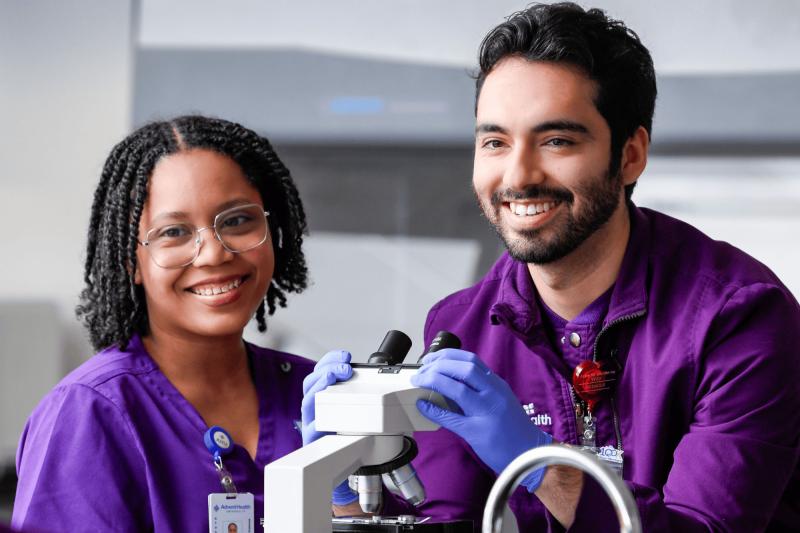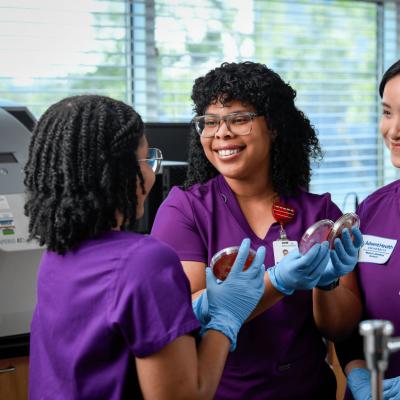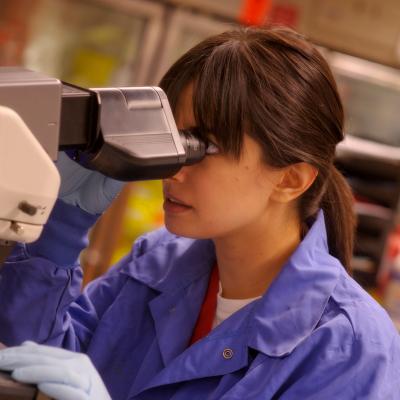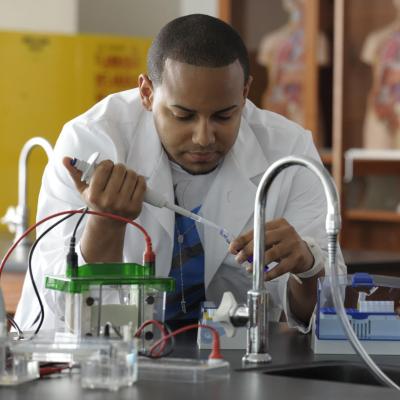- AdventHealth University

Have you ever wondered how doctors diagnose illnesses, track the effectiveness of treatments or even determine your blood type? Behind the scenes of every hospital and clinic, a team of highly skilled professionals works to provide the critical information that makes modern medicine possible: medical laboratory scientists. But what is medical laboratory science, exactly?
Medical laboratory science is the branch of health care that analyzes biological specimens — blood, tissues and other bodily fluids — to provide crucial data for patient diagnosis, treatment and monitoring. The dedicated professionals in this field, sometimes known as medical technologists or medical laboratory scientists, work diligently to ensure accurate and timely results. Their work is needed for everything from routine checkups to complex surgeries and emergency care.
What Do Medical Laboratory Scientists Do?
Medical laboratory science jobs are diverse and challenging, requiring a unique blend of scientific knowledge, technical skills, and problem-solving abilities. These professionals perform complex tests using sophisticated equipment, from microscopes and cell counters to advanced molecular diagnostic tools. Their responsibilities can include:
- Analyzing blood, body fluids and tissue samples
- Conducting tests to diagnose genetic disorders
- Crossmatching blood for transfusions
- Ensuring the quality and accuracy of test results
- Identifying bacteria, viruses and other microorganisms
- Monitoring the effectiveness of therapies
- Performing chemical analyses to measure levels of glucose, cholesterol and other substances
What Can You Do With a Medical Laboratory Sciences Degree?
A career in medical laboratory sciences typically requires a bachelor's degree in medical laboratory sciences, clinical laboratory science or a related field like biology or chemistry. Many programs also include a clinical internship or practicum, providing hands-on experience in a real-world laboratory setting. After completing their education, graduates can pursue national certification through organizations like the American Society for Clinical Pathology (ASCP) Board of Certification (BOC). This certification demonstrates competency and is often required by employers.
There are many different career paths a medical library scientist can choose from. Graduates can find job opportunities in:
- Diagnostic laboratories
- Forensic laboratories
- Hospitals and clinics
- Pharmaceutical and biotechnology companies
- Public health agencies
- Research institutions
Medical Laboratory Science Specializations
The field of medical laboratory science offers a variety of specializations, allowing professionals to focus on specific areas and develop in-depth expertise. Here's a closer look at some key specializations, from chemical chemistry to transfusion.
Clinical Chemistry
This area analyzes chemical components in blood and other body fluids, such as glucose, electrolytes, enzymes and hormones. Clinical chemists use sophisticated instruments to measure these substances and interpret the results to diagnose and monitor various conditions, including diabetes, heart disease and kidney disease. They might perform glucose tests, lipid panels and liver function tests.
Hematology
This specialization studies blood and blood disorders, including anemia, leukemia and clotting. Medical laboratory scientists specializing in hematology analyze blood samples to identify abnormalities in cell counts, morphology and function. They perform various tests, such as complete blood counts (CBCs), coagulation tests and bone marrow examinations, to provide data for diagnosing and monitoring these conditions. Hematologists and other health care providers interpret these results to develop appropriate treatment plans.
Immunology
Medical laboratory scientists specializing in immunology aim to understand and treat conditions related to the immune system. They work closely with immunologists to perform tests that assess immune function, diagnose autoimmune diseases and monitor the effectiveness of immunotherapies. Tests may include enzyme-linked immunosorbent assay (ELISA), western blots and flow cytometry. This specialization is essential for managing conditions like allergies, autoimmune disorders and immunodeficiency syndromes.
Microbiology
In a microbiology role, a medical laboratory scientist acts as a detective of the microbial world. They identify and analyze microorganisms that cause infections, such as bacteria, viruses, fungi and parasites. They perform cultures, identify pathogens and determine antibiotic sensitivities to guide physicians in choosing the most effective treatments. This specialization is critical in combating infectious diseases and preventing their spread. Medical laboratory scientists specializing in microbiology may perform Gram stains, bacterial cultures and antibiotic susceptibility testing.
Molecular Diagnostics
This field uses molecular techniques to diagnose and monitor diseases at the genetic level. Molecular diagnosticians can identify genetic mutations associated with inherited disorders, cancer and infectious diseases. This specialization revolutionizes how diseases are diagnosed and treated, enabling personalized medicine approaches. Molecular diagnosticians may perform tests such as polymerase chain reaction (PCR), DNA sequencing and microarray analysis.
Transfusion Medicine
Also known as blood banking, this specialization ensures the safety and compatibility of blood transfusions. Transfusion medicine specialists perform blood typing, crossmatching and antibody screening to prevent transfusion reactions. They also manage blood inventories and ensure the availability of safe blood products for patients in need. They perform tests like ABO blood typing, Rh typing and crossmatching.
Job Outlook for Medical Laboratory Scientists
The demand for qualified medical laboratory scientists is strong and projected to grow in the coming years. The Bureau of Labor Statistics (BLS) projects continued growth in medical laboratory science jobs through 2033, driven by factors such as an aging population, advancements in diagnostic technologies and the increasing prevalence of chronic diseases. This positive job outlook makes pursuing a medical laboratory science profession a promising choice.
Start Your Medical Laboratory Science Career
Medical laboratory science is a challenging yet deeply rewarding career for people who are passionate about science and dedicated to improving patient care. Medical laboratory science might be the perfect field if you’re interested in a career where you can make a real difference in health care.
Want to learn more about launching your career? Explore the Medical Laboratory Sciences program at AdventHealth University and request information today. We’ll answer your questions to help you determine if medical laboratory science is the right choice for you.


